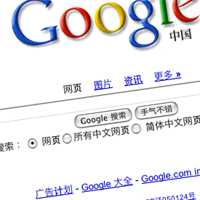 Google made headline news today for its decision to censor information on a new government-approved website for China.
Google made headline news today for its decision to censor information on a new government-approved website for China.Google.cn will be hosted inside China and is likely to censor search results on issues such as the Falun Gong movement, Tiananmen Square massacre and Tibetan freedom to comply with the policies of the Chinese government.
The search giant's existing Chinese-language version has been subject to blocks by authorities and, until now, Google had claimed to be the only major search facility in China not censoring search results from its standard US-based search-engine. Yahoo! has been collaborating with Chinese censors for more than three years.
News aggregator site Google News already excludes material from sources banned by the Chinese authorities.
"By offering a version without "subversive" content, Google is making it easier for Chinese officials to filter the internet themselves," said press freedom campaigners Reporters Without Borders.
"A website not listed by search-engines has little chance of being found by users. The new Google version means that even if a human rights publication is not blocked by local firewalls, it has no chance of being read in China."
Google has reportedly lost market share to the highly censored China-based search site Baidu (a company it bought a share of in July 2004) and its decision to comply with Beijing's censorship will be seen as a reflection of its commercial interests in the country. China is now the second largest internet market in the world and around 187 million web users are predicted by 2008.
Google's senior policy advisor Andrew McLaughlin told the BBC Today programme that Google had decided to provide disclosure to Chinese users when material had been excluded.
"We feel that is a step forward," he said.
"In general the decision will do more good by providing greater access to more information.
"China is changing. The flow of information and subjects is greater than 10 years ago and indeed at any point in the past - we want to help to accelerate that trend."
He added that Google did not plan to introduce its email, group or blog services to China.
Some web users in China can reportedly view the new site already, and an image of the censorship message has been posted to Flickr.
• Nearly 80 per cent of BBC News Interactive users voted that Google should not censor its Chinese search services.
• Earlier this week Google also announced that its news service has been taken off 'beta' status. Writing on Google's blog, creator Khrishna Bharat said the aim had been to organise the world's news in real time. "By presenting news 'clusters' we thought it would encourage readers to get a broader perspective by digging deeper into the news - reading 10 articles instead of one, perhaps - and then gain a better understanding of the issues, which could ultimately benefit society."
More news from journalism.co.uk:
Dungeons and dragons
BNP 'stories' continue to tarnish Google News
MSN closure of China blog prompts call for ethics guide
Google invests $1 billion in AOL
Yahoo! slammed by human rights groups
Google stonewalls CNET
Free daily newsletter
If you like our news and feature articles, you can sign up to receive our free daily (Mon-Fri) email newsletter (mobile friendly).
Related articles
- Open letter calls for a change in response to online abuse of women journalists
- Protecting independent journalism, with Lexie Kirkconnell-Kawana of IMPRESS
- Why Australia's bid to make big tech pay for news failed: views from an indie publisher
- Five key takeaways from the UK select committee on the future of news
- How Reuters, Newsquest and BBC experiment with generative AI









